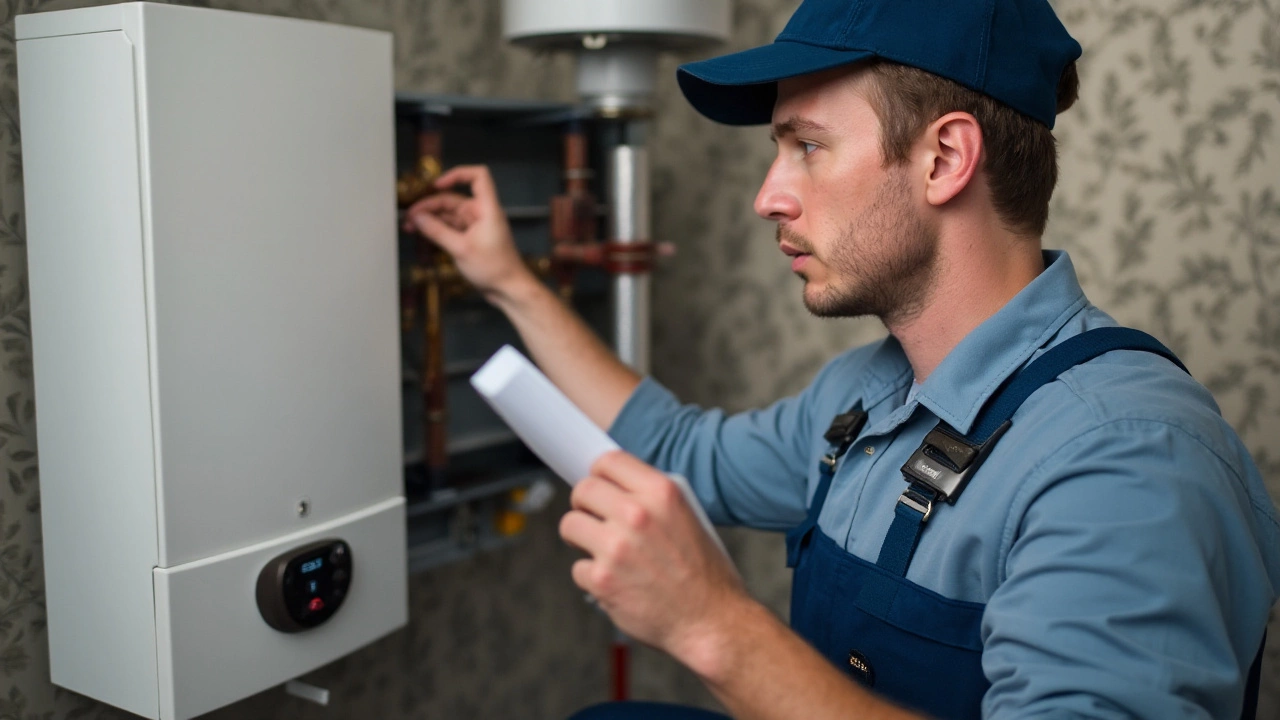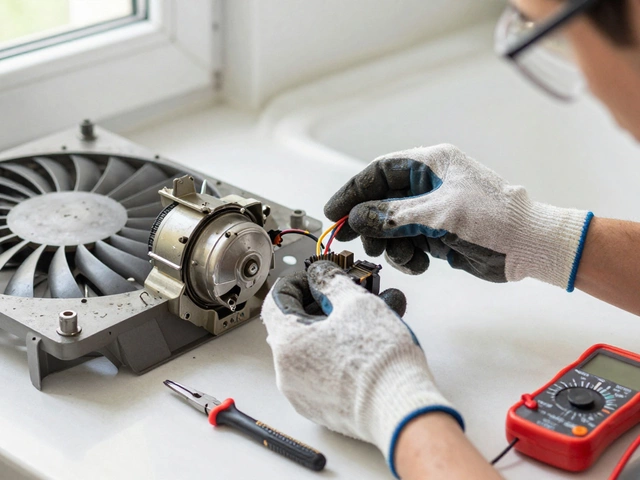Heating our homes efficiently is a central concern for many of us, especially as the colder months draw nearer. A reliable boiler forms the backbone of a home's heating system, quietly working behind the scenes to keep everything cozy. But how long can one reasonably expect a boiler to last?
Understanding the lifespan of a boiler goes beyond just years. It involves considering how well it's maintained, the type of system you have, and even environmental factors. Join us as we dig into what helps a boiler go the extra mile, what signs warn that its days are numbered, and how you can make the most of your heating system investment.
- Boiler Lifespan: What to Expect
- Factors Influencing Longevity
- Routine Maintenance: The Key to Durability
- Signs Your Boiler Needs Replacement
- Tips for Prolonging Your Boiler's Life
- Choosing a New Boiler: Things to Consider
Boiler Lifespan: What to Expect
When it comes to estimating the lifespan of a boiler, several elements come into play. Typically, you can expect a well-maintained boiler to last between 10 to 15 years. This time frame, of course, isn't set in stone. Factors such as the type of boiler, water quality, and maintenance regimen can significantly influence longevity. If you've invested in a high-quality combi boiler and have been diligent about annual servicing, you might find it outlives its average peers. However, for those who've neglected routine check-ups, the lifespan might drop to below a decade.
Boilers are often described as the heart of a home’s heating system due to their vital role. Their endurance is contingent not just upon mechanical factors but also environmental ones. Water quality, for example, can play a significant part in how long a heating system lasts. Hard water areas, rich in minerals, can lead to more scaling inside the boiler, causing it to wear out faster. It's informing, then, that many homeowners residing in areas with hard water choose to install water softeners to combat this issue.
Interestingly, different types of boilers exhibit varying lifespans. Standard gas boilers are known for their durability, often outlasting electric systems by a few years. This doesn't mean electric boilers are inferior; their simplicity makes them a great option, especially in settings where gas isn't available. According to a report by the Energy Saving Trust, maintaining a high standard of boiler upkeep including flushing the system and cleaning lines can elongate the working time significantly.
"A quality boiler that's looked after with care and used wisely can serve a household for nearly two decades, providing valuable warmth throughout its lifecycle," recommends John Carter, a heating engineer with over 30 years of experience.
For those wanting to push their boiler beyond the usual limits, it's not solely about mechanics. A conscious effort to reduce wear through smart usage plays a crucial role. This includes setting realistic heating schedules, avoiding rapid temperature fluctuations, and ensuring you don't overburden the system with excessive demands. These seemingly small adjustments can spare your boiler a couple of extra years, helping households save money on inevitable replacements.
It's worth considering that not all boilers are created equal. Some manufacturers offer extended warranties due to their belief in the durability of their products, often influenced by the quality of components used and innovative engineering techniques. Such warranties can be an excellent indicator of a boiler’s prospective lifespan and reliability. For those navigating the purchase of a new system, exploring these offerings might be the deciding factor between a 10-year boiler and a 20-year one.
Factors Influencing Longevity
When considering how long a boiler will last, several critical factors come into play. An essential element is the boiler maintenance routine employed; much like any mechanical system, regular check-ups can significantly extend a boiler's operational life. Neglecting annual servicing might save a few dollars in the short term, but it can also shave years off the life of your unit. It's typically during these check-ups that professionals spot minor issues before they become costly repairs. During a standard service, technicians often examine the heat exchanger and clean parts prone to soot buildup, ensuring efficiency and reducing wear and tear.
Another vital aspect to consider is the quality and type of your boiler. A high-efficiency condensing boiler could offer different durability compared to traditional units. Although upfront costs for high-efficiency models might be steeper, their ability to convert more fuel into thermal energy efficiently often pays off over time. Moreover, water quality plays a role in boiler longevity, as hard water can lead to lime scale buildup, affecting efficiency and lifespan. Installing a water softener or a filter could mitigate this issue significantly, keeping your heating systems in good shape for years.
The installation quality and the expertise of the technicians involved can not be underestimated. Improper installation can lead to a myriad of issues, ranging from energy inefficiencies to safety hazards, all of which can drastically decrease a boiler's lifespan. It's crucial to hire certified professionals who are familiar with the specific type of boiler and its unique quirks.
"A well-installed and properly maintained boiler can last upwards of 15 years," notes John Smith, a leading HVAC consultant with over 20 years of experience.
Moreover, usage patterns also play a significant role in determining how long a boiler can effectively serve. Systems that operate continuously at high demand might not last as long as those used moderate or seasonally. Developers must consider implementing zoning in homes to reduce unnecessary strain on the boiler. Turning off heating in unoccupied rooms and using smart thermostats to regulate temperature more efficiently are practical approaches. Lastly, external environmental conditions also matter. Exposure to extreme weather changes, both in terms of temperature and humidity, can influence a boiler's material endurance and functionality. Thus, boilers located in controlled indoor environments generally tend to last longer compared to those in less protected spaces.

Routine Maintenance: The Key to Durability
Maintaining a boiler isn't just about ensuring you have hot water and heating when you need it; it's also about preserving your investment. Proper care can significantly extend the boiler lifespan, saving both money and headaches in the long run. It all begins with understanding what maintenance involves. Regular check-ups by a certified technician are essential. These visits help in identifying potential issues that, if left unaddressed, could turn into costly repairs or necessitate premature replacement of the entire system. But checking components isn't just about spotting problems; it's about optimizing your heating system for better performance.
One key aspect of maintenance is the annual service, which is a must. During this service, the technician will clean critical parts and ensure everything is running smoothly. This cleaning helps prevent carbon build-up, which can not only reduce efficiency but also pose safety risks. Did you know that a well-maintained boiler can also cut down on your energy costs? By running more efficiently, your boiler uses less fuel to achieve the desired results. It's a win-win for your wallet and the environment.
An often overlooked yet crucial element of maintenance is the bleeding of radiators. Air can get trapped inside the system, which in turn diminishes heat distribution. Regularly bleeding your radiators can enhance heat output and keep your system running nominally. Another component that requires attention is the pressure gauge. Keeping it within the recommended range ensures your boiler operates optimally. Many experts suggest checking this monthly.
"Think of boiler maintenance like getting your car serviced. Without regular check-ups, performance diminishes, and the risk of breakdowns increases," says Alex Johnson, a renowned HVAC specialist.
Adding this to your regular household chores may seem daunting, but setting reminders can simplify it. You can create a calendar alert for an annual service or decide on a day each month to check the pressure and bleed radiators if needed. A little routine care goes a long way. Keep an eye on the burner flame, too; it should be a bright blue. If it turns orange or yellow, it may indicate incomplete burning or a gas leak, which needs immediate professional attention.
If you're a fan of data, consider this: a survey by the Energy Saving Trust found that regular servicing can enhance a boiler’s efficiency by 10%. This, in turn, slashes annual boiler energy costs by about 5-10% on average. Investing in a service plan can offer peace of mind, knowing that the care of your heating workhorse is in the hands of professionals.
Maintaining your boiler might not top your list of exciting weekend plans, but the small effort involved in regular upkeep can save a lot of pain and expense down the line. Paying attention to these maintenance details makes a compelling case for better boiler health, ensuring your home stays warm when it matters most.
Signs Your Boiler Needs Replacement
In the life of a heating system, there comes a time when repairs no longer suffice and replacement becomes inevitable. Spotting the signs early can save both heartache and unexpected chill come winter. One of the most telling indicators that a boiler is nearing the end of its useful life is a dramatic increase in energy bills. An older or failing system tends to work harder to produce the same amount of heat as it once did effortlessly, leading to inefficient energy usage. A consistently rising energy bill without any significant change in household consumption habits might be a whisper from your heating system, urging you to pay attention.
Persistent noises — banging, clunking, whirring — these are not the usual hums of a happy machine. Instead, they are signals that parts are failing or wear is taking an inevitable toll. While some noise can come from loose parts or air pockets, frequently occurring disturbances should prompt a check-up. Moreover, if your boiler lifespan stretches beyond the standard 10-15 years, it may be timely to start thinking about saying goodbye to your old friend. Age, coupled with an increase in breakdowns or frequent repairs, signals that investing in a new system might be more cost-effective than patching up a relic. As Scott Taylor, a noted energy consultant, once quipped,
"An aging boiler is like a vintage car; charming, yes, but costly to keep on the road."
Standing water or persistent leaks under or around the boiler are more than just minor inconveniences; they could be indicators of internal component failures or even corrosion setting in. Rust and corrosion are from hell’s own kitchen when it comes to metallic components, particularly within heating systems where structural integrity is paramount. Any repeated need for topping up the pressure is also a red flag. Pressure issues within a boiler system highlight potential leaks or malfunctioning expansion vessels, often leading to damage elsewhere if not addressed promptly. Keeping an eye on the pilot light color can also reveal much. A yellow or orange flame, rather than a steady blue, may suggest your boiler isn't burning efficiently, potentially releasing harmful carbon monoxide.
Beyond the physical signs, a lack of faith in the system speaks volumes. If you're constantly on edge, anticipating the next fail, it's a mental burden worth considering. Regularly fiddling with your boiler to coax warmth, or often calling for technician support, disrupts daily life and peace of mind. Keeping a list of how often repairs or interventions are needed can help clarify this picture. Investing in consistent and boiler maintenance can stave off problems for a time, but ultimately, reliability and efficiency are key to a welcoming home environment — something an outdated system simply can't guarantee.

Tips for Prolonging Your Boiler's Life
Keeping your boiler running efficiently for as long as possible isn't just about saving money; it's about ensuring your home remains comfortable during peak heating periods. Regular maintenance is perhaps the single most indispensable action you can undertake to extend a boiler's lifespan. This includes scheduling annual services with a certified professional who can check everything from the heat exchanger to the burner and fans. Such expert inspections can identify small issues before they escalate into costly repairs or, worse, a complete boiler failure. It's always best to be proactive rather than reactive with such a critical component of your home.
"Regular maintenance is your boiler's best friend," advises John Westfall, a seasoned HVAC technician. "It not only keeps your system running smoothly but also ensures your family's safety by preventing leaks and carbon monoxide emissions."
Another method to extend your boiler's life is to bleed your radiators. This simple procedure involves releasing trapped air that can prevent hot water from circulating correctly, putting unnecessary strain on your boiler. You'll know it's time to bleed when radiators feel cooler at the top than at the bottom. Learning the right way to bleed radiators can conserve energy, improve efficiency, and reduce stress on the heating system. It's a straightforward process that can be done quickly and effectively with a radiator key, and it's one of the simplest maintenance tasks that you can perform yourself without technical help.
Ensuring your boiler system is clean is equally crucial. Sediment buildup in the boiler can clog waterways and create hotspots, leading to uneven heating and potential damage over time. Flushing your system regularly or using a system inhibitor to prevent rust and limescale formation can be instrumental in maintaining the efficiency and longevity of your boiler. This preventative measure helps to keep your heating system healthy, preserving its ability to function effectively even as the years go by.
Keep an eye on the external components too. Ventilation around the boiler must be adequate to allow it to run safely and efficiently. Blocked vents or insufficient clearance can overheat your system and decrease its lifespan significantly. An unobstructed airflow is crucial, so do check this periodically. It's also wise to listen to your boiler. Unusual noises can be a sign of underlying issues. Banging pipes or kettling sounds often mean there's air or sludge buildup in the system, which should be addressed promptly to prevent damage.
Finally, consider upgrading your thermostat to a smart one, which offers better control over your heating schedule. By intelligently managing your home's temperature, these advanced thermostats help you reduce energy consumption and minimize the wear and tear on your boiler. Smart thermostats can adapt to your habits over time, cycling the system less often when unnecessary, which helps prolong the life of your boiler.
Boiler maintenance is not solely about call-outs and tuning; it encompasses a broader understanding of how your boiler functions in your home. By combining professional check-ups with simple at-home maintenance, you can significantly extend the life of your heating system and ensure it operates efficiently and safely for years to come.
Choosing a New Boiler: Things to Consider
When the time comes to select a new boiler, several critical factors should guide your decision. Understanding today’s market offerings ensures you not only get the best value for your investment but also enjoy a unit that meets your specific needs effectively. Consider the type of fuel your household uses; natural gas, oil, electricity, or LPG are common, each with its own pros and cons. Gas boilers are popular due to their efficiency provided you have access to a gas line. On the other hand, electric boilers can be more convenient if you’re looking for simpler installation options and space-saving benefits.
A crucial point not to overlook is sizing. The size of your boiler should match the heating demands of your home. A boiler too small might struggle to provide enough heat, while an oversized unit can increase operational costs due to frequent cycling on and off. Conduct a comprehensive heat loss calculation or consult with a professional to determine the correct boiler size for your home. Additionally, consider the various types of boilers available. Combination boilers, for instance, are popular in smaller homes due to their space efficiency as they provide instant hot water without the need for a separate water tank.
Boiler maintenance requirements are another important consideration. Investigate how often your prospective boiler needs servicing and what such maintenance entails. Some models might require more frequent attention than others, so make sure these requirements align with your lifestyle and budget. Warranty terms should also be evaluated; longer and more comprehensive warranties often suggest manufacturer confidence in the product's durability and performance. Moreover, modern boilers offer innovative features such as smart thermostats and connectivity options that allow more control over your home's heating system, potentially leading to significant savings on your energy bills.
Installation costs can vary widely based on complexity and any additional components needed, such as new piping or venting. To get a clear idea of installation expenses, it's advisable to get detailed quotes from several qualified installers. Don't shy away from asking about the credentials of the company or individual performing the work. A properly installed boiler not only meets efficiency standards but also guarantees safer operation. According to a study by the Energy Saving Trust, upgrading your old boiler to a new energy-efficient model can save up to £300 a year on bills, depending on your house and boiler setup.
"Choosing the right boiler demands careful consideration of multiple factors—it’s a significant investment that, when selected wisely, enhances comfort and efficiency for many years," emphasizes a spokesperson from the Boiler Guide.
Finally, choosing a new boiler is an opportunity to reflect on your overall home heating strategy. It might be time to improve insulation or update your radiator systems to complement your new boiler's efficiency. This holistic approach not only enhances warmth distribution but also extends the effectiveness and lifespan of your boiler. Keep all these considerations in mind as you navigate through the selection process, ensuring your investment leads to increased home comfort and reduced energy bills in the long term.





